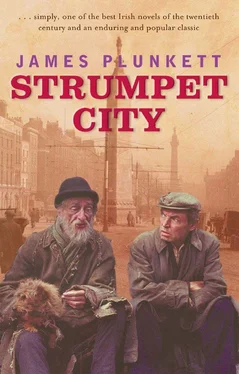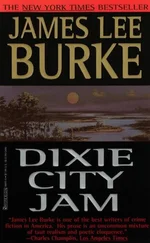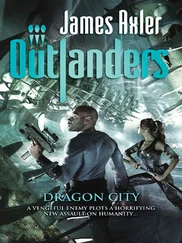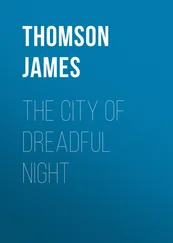‘Florence is right,’ Mr. Bradshaw said. ‘It was in 1900. I remember now.’
‘We can be proud that he was an Irishman,’ Father O’Connor said.
Mr. Bradshaw liked strict accuracy. ‘Well, the son of an Irishman—an Irish bandsman.’
When he died he was Sir Arthur Sullivan. Mrs. Bradshaw said she thought it wonderful that a humble youth should reach such heights.
‘He had the divine gift,’ Mr. Yearling pronounced solemnly. ‘The gift of music. What are we others, after all, but penpushers. Directors, property owners, public servants, nothing but glorified nonentities. One of us dies and the world is still the same. Sullivan dies—and the world is the poorer until God permits another genius to come and walk among us.’
This time he helped himself to the whiskey decanter uninvited and poured a large measure.
‘The song,’ Mr. Bradshaw said, uneasily.
Mr. Yearling suggested the introduction to the second act which contained a sombre opening for the ’cello, but little else that the company could manage satisfactorily, because of the disposition of the voices and the fact that it required a chorus too. Father O’Connor came out best, with a moving interpretation of ‘Is Life a Boon?’ Mr. Bradshaw remained silent but Mr. Yearling supplied an obbligato on the ’cello. Then Mrs. Bradshaw, knowing how much her husband enjoyed singing and not wishing him to feel neglected, closed the score and produced a volume of Moore’s melodies which contained duets which occupied everybody, the priest and Mr. Bradshaw on the voice parts, accompanied by piano and Mr. Yearling’s clever ’cello improvisations. Then she asked if it was time for soup. The men searched for their watches. As Father O’Connor produced his, Mr. Bradshaw thought he heard something fall.
‘Have you dropped something, Father?’
‘I don’t think so,’ Father O’Connor replied. They scanned the carpet mutually but could see nothing. Mrs. Bradshaw rang and Mary served them with soup. They sat around, informally conversing.
‘Your “Is Life a Boon?” revived some happy memories for me tonight, Father,’ Mr. Yearling said sadly. They looked at him with polite interest.
‘I was at one of the first performances of The Yeomen in the Savoy. George Grossmith sang Jack Point and Courtice Pounds was Fairfax. That was nearly twenty years ago.’
‘Is it so long?’ Mr. Bradshaw said.
‘It is, Ralph, October 1888. I was a young dog on my first visit to London. Wonderful. And a pretty girl with me too.’ He turned particularly to Father O’Connor. ‘All very correct and everything in order, Father, no wild oats or that sort of thing.’
‘Of course,’ Father O’Connor said quickly, but modulating his tone to convey a reminder of Mrs. Bradshaw’s presence.
‘Truth is, I was madly in love with her.’
‘But you didn’t marry her?’ Mrs. Bradshaw asked, allowing herself to betray a woman’s curiosity.
‘She wouldn’t have me, ma’am,’ Mr. Yearling confessed. He turned to Mr. Bradshaw. ‘You know, Ralph, we Irish chaps don’t stand much chance against the fellows over there. We think we have polish, poise, elegance, but in thirty minutes at the smallest social gathering the British fellow has us completely outclassed.’
‘Oh, I don’t know,’ Mr. Bradshaw protested.
‘It’s true, Ralph. And I’ll tell you why. Gentility, manners, social behaviour, they’re all part of a game, a sort of national game which is played to different rules in different countries. The British play their own game best because they’ve made the rules to suit the British temperament and the British climate.’
‘I don’t see the difference,’ Mr. Bradshaw said. He had taken up the decanter again and was handing Mr. Yearling his glass. Mr. Yearling raised it and looked around at everybody.
‘There’s part of the difference,’ he said sadly, indicating the golden spirit. ‘I won’t embarrass your good wife with the grisly details.’
Mrs. Bradshaw smiled her gentle smile as he threw back his head and swallowed. She knew his weakness and could guess that it had once, perhaps, been a wildness. She thought, a little wistfully, that a touch of human weakness in her husband would have been nice, her husband who was so good but at times so meticulous, at times so grumpy with rectitude. She rang for Mary to take the plates and said: ‘You may go to bed as soon as you have cleared away. Leave whatever is inessential until morning.’
The company rose and Mr. and Mrs. Bradshaw accompanied them into the garden. The night air was mild and perfumed with mown grass and flowers. A rocket sailed upwards in a bright parabola and burst brilliantly above their heads. They gasped with surprise. ‘What on earth . . .?’ Mr. Bradshaw exclaimed.
Mrs. Bradshaw remembered.
‘It’s the firework display at the Pavilion.’
‘Ah, of course,’ Mr. Yearling said.
She remembered the notice in the paper that morning which had advertised the attractions.
‘Grand Illumination of the Bldgs & Gardens by Brock. Grand Display of Fireworks. Portraits of Their Majesties. Bands, pipers, sword dancing. Torchlight procession in the gardens. Illuminations of The Fleet.’ Russel Rosse and company were playing Arabian Nights .
They looked up at the sky for some time. Now and then one or the other made an exclamation of admiration. The multicoloured fireworks traced elaborate patterns above the garden. Now and then one burst with a brilliant blooming and sent a joyful cascade of light pouring through the sky, lighting up the garden and picking out the upturned faces of the men: Father O’Connor, young, almost childish, frankly enjoying it; Mr. Yearling, with his great, bushy eyebrows, his long neck, his tall, spare figure and greying hair, smiling; her husband, thin, not quite as tall as Mr. Yearling, interested but unsmiling. There was something boyish about the three of them. Mrs. Bradshaw felt the moment keenly, felt the night about her, felt the soft dark air of the garden, felt the extra touch of excitement which had become part of the day itself. She sighed. The moment filled her with an oppressive sense of mortality. She wanted to leave the garden and get back into the house, to feel its four walls putting comfortable bounds to a world which was too wide and careless to hold intact for any certain period the happiness it now and then offered. She shivered and the others noticed.
‘We mustn’t detain you,’ Mr. Yearling said.
They took their leave and went out through the gate. Mr. Bradshaw put the heavy chain on the hall door and began his nightly task of winding each of the clocks.
The rockets made a playground of the sky for an hour on end, while Mary watched from her bedroom window, thinking of Fitz, speaking silent messages to him, living again the moments of their day together. As they burst and drew successive cheers from the watching crowds, Death kept its ordained appointment with the little boy in his strange hospital bed. The night sergeant suffered the news quietly. He had been expecting it since early evening. Rashers, exhausted by the day, sat on his straw bed in the dark and told the dog about him.
‘He was kind, Rusty,’ he said. ‘Imagine that. I met a kind sergeant today, the first kind policeman in history.’
The dog raised itself in response to Rashers’ voice, placed its paws on Rashers’ knees and, sniffing delicately, began to lick the dried blood on the side of his face.
CHAPTER TWO
On Thursday, the eleventh day of July 1907, King Edward honoured the races at Leopardstown with his royal presence and on Friday 12th he sailed away, leaving behind him a genteel glow of goodwill and friendliness, marred only by a piece of gossip which turned out eventually to be true. Mr. William Martin Murphy, Chairman of the Exhibition Committee, owner of Independent Newspapers, a large drapery business and a hotel, controlling director of the Dublin Tramway Company and several other large-scale ventures, had refused a knighthood at the opening of the exhibition. Yearling, who was in intimate contact with the business gossip of the city, being a director himself, told Father O’Connor about it when they met one day along the harbour front. Father O’Connor was reading his office. Yearling, looking spruce and smart in a grey suit with a flower in his buttonhole, tapped him on the shoulder.
Читать дальше












